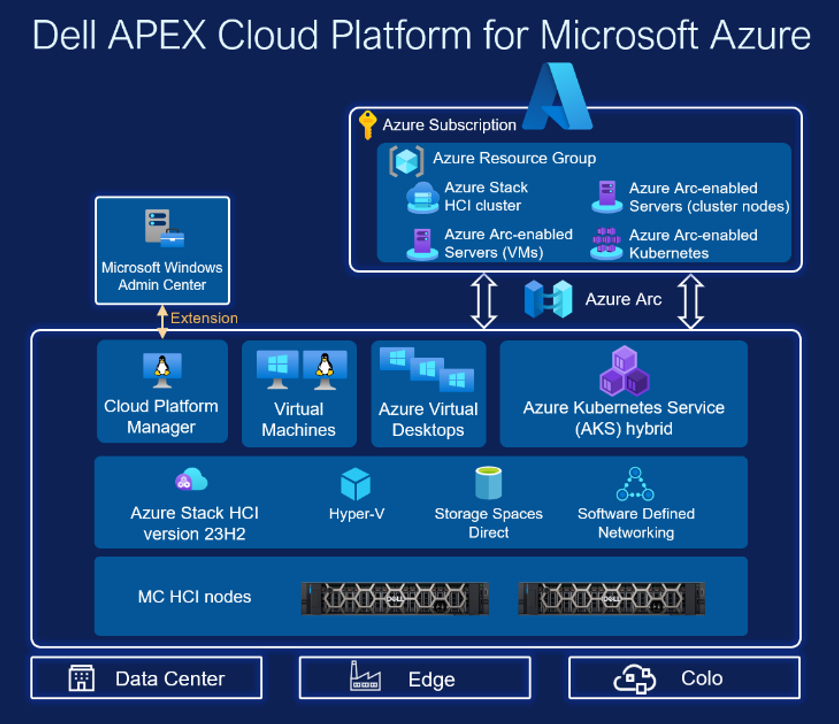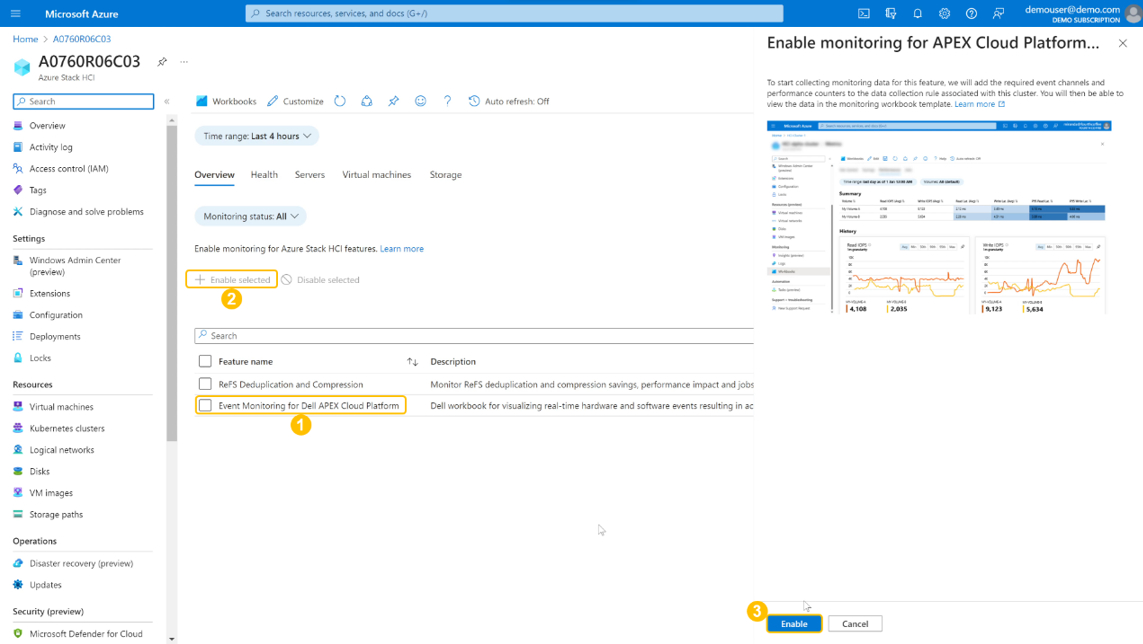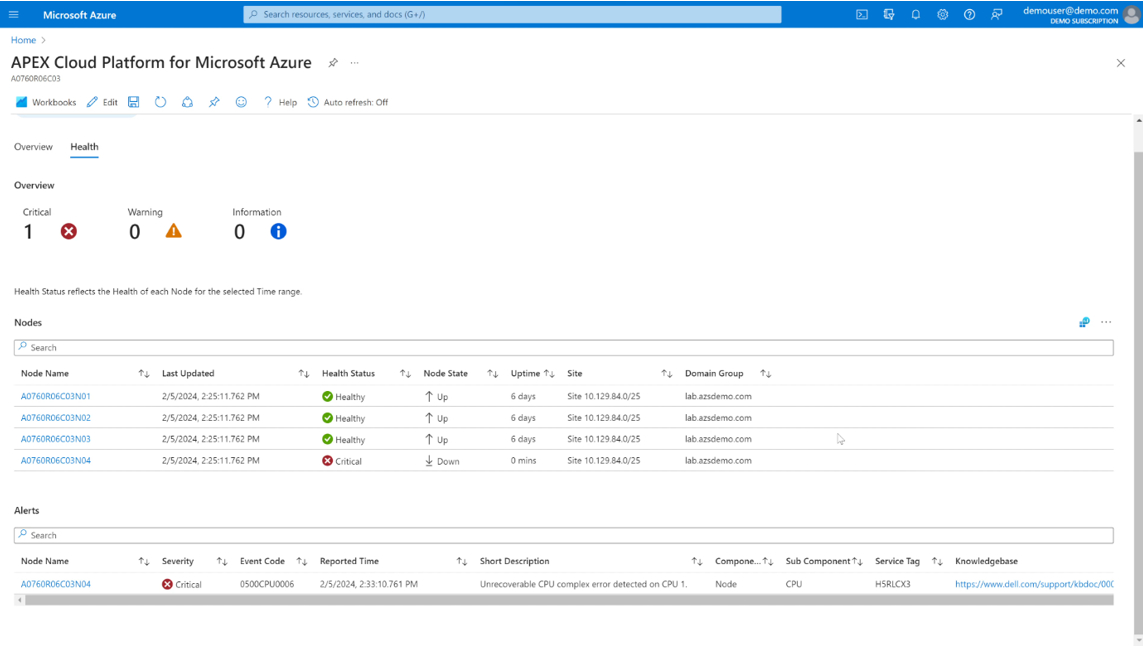In September 2023, Dell officially released Dell APEX Cloud Platform for Microsoft Azure, the first offer in the market for Premier Solutions for Microsoft Azure Stack HCI.
Collaboratively built with Microsoft, this new platform extends and optimizes Azure Hybrid Cloud to on-premises, delivering three fundamental benefits:
- Simplifying deployment and operations
- Accelerating application modernization
- Optimizing workload placement

Figure 1. Dell APEX Cloud Platform for Microsoft Azure Architecture
The innovation at Dell Technologies never stops. Dell is constantly developing and improving its products, and Dell have just launched our first update to the platform. Briefly, this release introduces and enhances:
- New Features:
- Azure Stack HCI, version 23H2
- Single-node expansion to a 2-node cluster
- Convert 2-node switchless storage network cluster to 2-node switched storage
- ACP foundation software improvements:
- Day 0/1 Operations (Automated cluster deployment up to 16 nodes, JSON file upload, Day 1 RESTful APIs)
- Day 2 Operations (GUI for drive add/replace, GUI for node repair/replace)
- Integrations:
- Serviceability (Add ESE/RSC logs to support log bundle collection)
- Azure Update Manager
- Event Monitoring for Dell APEX Cloud Platform for Microsoft Azure
Event Monitoring for Dell APEX Cloud Platform for Microsoft Azure
Dell APEX Cloud Platform for Microsoft Azure seamlessly integrates with Microsoft’s Azure Portal, providing the ability to monitor events generated on both Dell APEX Cloud Platform for Microsoft Azure hardware and the Cloud Platform Manager VM.
This new Insights for Azure Stack HCI monitor feature allows our customers to directly visualize in Azure Portal informational event data generated by the multicloud (MC) node hardware and the Cloud Platform Manager VM using an Insights integrated workbook.
With this workbook, we are empowering users to effectively manage and optimize their clusters and, in turn, receive the benefit of accelerated issue detection and time to resolution. I know, we’re excited too.
Enabling Event Monitoring for Dell APEX Cloud Platform for Microsoft Azure: Is it difficult?
Not really. Simply follow these steps:
- First, ensure you meet these mandatory prerequisites in your cluster:
- Azure Stack HCI, version 23H2 (registered and connected to Azure)
- Arc-enabled (Azure Monitor extension installed)
- Insights enabled
Once you have completed the prerequisites, navigate to the Insights page of your cluster in Azure portal and:

Figure 2. Enabling Event Monitoring in Azure portal
-
- Select the Event Monitoring for Dell APEX Cloud Platform for Microsoft Azure workbook
- Click Enable selected
- Click Enable to enable the workbook
Boom. Done. That was easy, and now the workbook is enabled…what is next?
What does Event Monitoring for Dell APEX Cloud Platform for Microsoft Azure look like?
Once the page refreshes, you’ll be taken to the first of the two tabs of the workbook – the Overview tab – which provides a brief description of what this workbook is and the information it can provide to its users.

Figure 3. Event Monitoring for Dell APEX Cloud Platform Overview tab
The second tab in the workbook – the Health tab – presents a summary of the alerts or events that have occurred on the cluster, broken down into Warning, Critical, and Informational alerts.
The Health tab also provides a Nodes table with a high-level overview of each node for the selected time range, including which cluster it belongs to, the node name, health status, node state, uptime, and domain.

Figure 4. Event Monitoring for APEX Cloud Platform for Microsoft Azure Health tab
A second table – the Alerts table – shows each alert in greater detail, including its corresponding node, component and subcomponent, severity level, event code, product service tag number, reported time, a short description, and even a knowledgebase article for issue diagnosis and troubleshooting guidance.
Note that you can leverage the Search bar to filter the information based on a given search term and the Time Range drop-down menu to show the events that occurred on all the MC nodes for the cluster within a specific time range.
Conclusion
Our workbook, Event Monitoring for Dell APEX Cloud Platform for Microsoft Azure, makes real the ability to monitor events generated on both Dell APEX Cloud Platform for Microsoft Azure hardware and the Cloud Platform Manager within the Azure Portal.
This powerful integration provides a great deal of value, significantly reducing the issue detection time and time to resolution.






